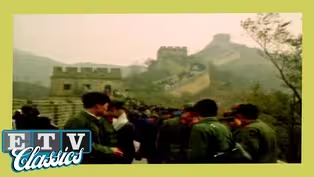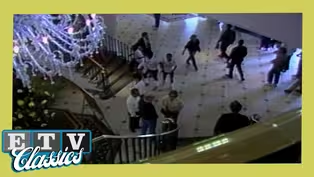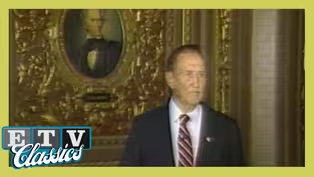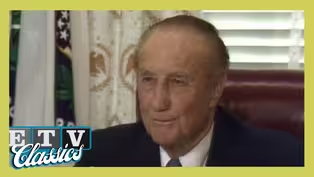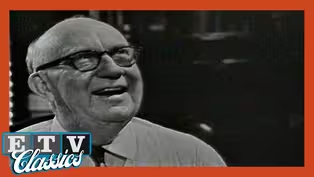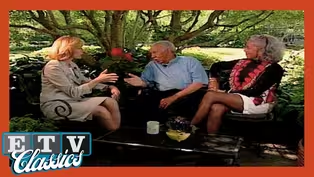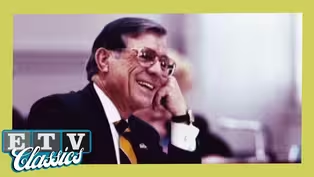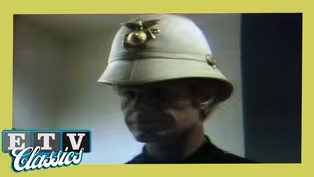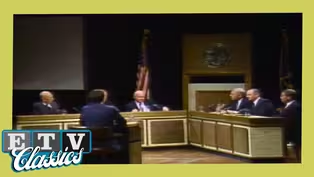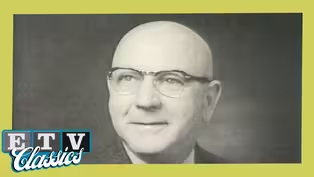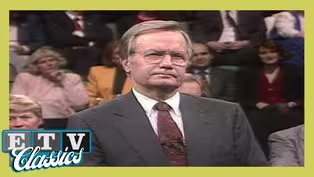ETV Classics
Elie Wiesel | Solomon Tenenbaum Lectureship in Jewish Studies (2006)
Season 15 Episode 14 | 1h 17m 18sVideo has Closed Captions
Professor Elie Wiesel, first Nobel laureate delivers a lecture as a part of the Tenenbaum series.
On September 12, 2006, Andrew A. Sorenson, President, University of South Carolina introduced the lecturer for the 17th annual Solomon Tenenbaum lecture in Jewish Studies, Professor Elie Wiesel, the first Nobel laureate to deliver a lecture as a part of the Tenenbaum series.
Problems playing video? | Closed Captioning Feedback
Problems playing video? | Closed Captioning Feedback
ETV Classics is a local public television program presented by SCETV
Support for this program is provided by The ETV Endowment of South Carolina.
ETV Classics
Elie Wiesel | Solomon Tenenbaum Lectureship in Jewish Studies (2006)
Season 15 Episode 14 | 1h 17m 18sVideo has Closed Captions
On September 12, 2006, Andrew A. Sorenson, President, University of South Carolina introduced the lecturer for the 17th annual Solomon Tenenbaum lecture in Jewish Studies, Professor Elie Wiesel, the first Nobel laureate to deliver a lecture as a part of the Tenenbaum series.
Problems playing video? | Closed Captioning Feedback
How to Watch ETV Classics
ETV Classics is available to stream on pbs.org and the free PBS App, available on iPhone, Apple TV, Android TV, Android smartphones, Amazon Fire TV, Amazon Fire Tablet, Roku, Samsung Smart TV, and Vizio.
Providing Support for PBS.org
Learn Moreabout PBS online sponsorshipMore from This Collection
Open Line: Carolina to Shanxi (1980)
Video has Closed Captions
An exchange program for higher education between USC and the people of China's Shanxi Province. (28m 51s)
Charleston Place | Carolina Journal (1986)
Video has Closed Captions
This edition of "Carolina Journal" revisits the opening of the Charleston Place complex. (27m 20s)
U.S.S. South Carolina | Carolina Journal (1984)
Video has Closed Captions
Michael Collins goes aboard the missile cruiser U.S.S. South Carolina as it visits its namesake. (28m 54s)
Strom Thurmond Remembered (2003)
Video has Closed Captions
Charles Bierbauer reviews the life and accomplishments of South Carolina Senator Strom Thurmond. (1h 51m 22s)
Strom Thurmond At The Seat of Power (1982)
Video has Closed Captions
The documentary follows the life and career of Strom Thurmond. (29m 49s)
Profile: The Senator from Barnwell: Edgar A. Brown (1967)
Video has Closed Captions
A visit with the venerable Edgar A. Brown in his law office, home, and the streets of his hometown. (14m 42s)
A Conversation with Justice Ernest Finney, Jr.: A Lifetime of Success (2000)
Video has Closed Captions
The honorable Judge Ernest A. Finney, Jr. discusses his life, career, and legacy in SC's lawfare. (27m 47s)
Profile: Senator John Drummond of Ninety-Six | The Big Picture (2008)
Video has Closed Captions
The life and times of Senator John Drummond of Greenwood, South Carolina. (26m 53s)
Video has Closed Captions
The memoirs of three businessmen who attribute their successes to their time in the US Marine Corps. (28m 54s)
The Governors' Roundtable | Carolina Journal (1989)
Video has Closed Captions
A round-table discussion with nine men who served as governor of the state of South Carolina. (57m 54s)
Solomon Blatt: Speaker Emeritus of the SC House | Carolina Journal (1985)
Video has Closed Captions
The life and career of Solomon Blatt, Speaker Emeritus of the S.C. House of Representatives. (27m 49s)
Remembering Bill Moyers: War in the Gulf - Town Meeting (1991)
Video has Closed Captions
Bill Moyers, who died June 26, 2025, was an award-winning journalist and PBS host. (59m 32s)
Providing Support for PBS.org
Learn Moreabout PBS online sponsorship♪ ♪ ♪ President Andrew Sorensen> This is the 17th annual Solomon Tenenbaum Lecture in Jewish Studies.
We're pleased to have with us this evening Professor Elie Wiesel, the first Nobel laureate to deliver this lecture.
I'm especially pleased to acknowledge the gifts of Judith and Melvin Solomon and of Inez and Samuel Tenenbaum on my right and on your left, whose generosity made this lecture possible.
Please join me in thanking them.
(applause) (applause) The vast majority of us academics are accused above about standing above the fray, preoccupied with analysis of scholarly discovery in our respective fields.
And when we do provide oral and written commentary on the events in what seems to be the increasingly complex, chaotic world, more often than not, we are accused of failing to immerse ourselves in the hurly burly of the marketplace in which the active promotion of peace in the midst of intense conflict runs the substantial risk of being portrayed as massively insensitive to the respective partisans and those of us who reject that posture and choose to get down in the trenches, taking strong, visible positions on problems regarded as insoluble are frequently accused of being hopelessly subjective, given to intemperance, rushes to judgment, and as more than 40 books, several of which have received internationally recognized prizes as well as countless lectures.
Professor Wiesel manages to reflect regularly on the currents swirling all about us, but the miracle of it all is that he does so in a manner that is perceived as rational, yet wonderfully passionate.
Mr. Wiesel, we are profoundly honored by your presence with us this evening.
We look forward to you sharing with us the wealth of your wisdom.
Shalom.
It's now my pleasure to introduce Dr. Mary Anne Fitzpatrick, who is the dean of our College of Arts and Sciences, to offer remarks.
Mary Anne.
Mary Anne> Thank you, President Sorensen, on behalf of the College of Arts and Sciences and the University of South Carolina, it is my distinct privilege to introduce the distinguished guests seated on the platform who are sharing this extraordinary event with us this evening.
When I announce the names, I would appreciate it if the members of the platform party can stand, but in the interest of time, I ask the audience to hold their applause.
I know we are all anxious to hear our distinguished guests this evening.
Now I begin first with Holocaust survivors.
Mrs. Bluma Goldberg.
Please stand.
Mr. Pincus Kolender and his wife, Janet.
As President Sorensen has mentioned, our lecture has been endowed by Mr. Samuel Tenenbaum and his wife, the honorable Inez Tenenbaum.
Mr. Melvin Solomon and his wife, Judith are also with us this evening.
The university president, Dr. Andrew Sorensen, and his wife, Mrs. Donna Sorensen, the University of South Carolina's provost and chief academic officer, Dr. Mark Becker and his wife, Laura... the chair of Religious Studies, Dr. Carl Evans, and we can hear from Carl a bit later in this program.
Finally, on behalf of the college and the university, I want to thank the other donors to the lecture who've made this evening possible for us.
Mr. Jerry Baxter and his wife, Cheryl, representing the Ben Arnold Company, Dr. Lilly Phelan and Mr. Bruce Phelan.
Mr. Richard Burgos is with us this evening.
Mr. Henry Goldberg and his wife, Gloria.
Mr. Carl Goldberg and his wife Margo.
Mrs. Esther Greenberg and her husband, Hiram.
Mr. Alan Cohn and his wife Charlotte.
Mrs. Tanya Merciano and her husband Isaac.
Mr. Jeff Seelig, his wife Walton and their children Sam and Rica are here as well.
Mr. Ed Sellers and his wife, Suzanne Boyd, on behalf of Blue Cross Blue Shield.
Dr. Gordon Smith and his friend Doug Wolf, on behalf of the Walker Institute.
Dr. Selman Smith and his wife, Dorothy on behalf of the Holocaust Council, Mr. Don Tomlin and his wife, Rochelle.
Mr. Samuel Walden, his wife Ellen, daughter, Alyssa and friend Mark Clackham.
And Mr. David Zelensky and his wife, Annie.
In addition, we are honored with a visit from the former Prime Minister as well as Foreign Minister of Poland, the honorable, Mr. Wodzimierz Cimoszewicz, and his wife, Barbara.
My husband Roman Kyweluk.
And now I would also like to please ask the, I know that we have Holocaust survivors in the audience who are with us this evening, and I would very much like them to stand and please join me in a round of applause, a warm round of applause for all of our guests (indiscernible) It, It is my distinct pleasure on behalf of the college to now introduce, Dr. Carl Evans, the chair of our religious studies program, who really has been the spirit for a number of years behind this wonderful lecture series.
(applause) Dr. Evans> Thank you.
Mary Anne, before I introduce the speaker this evening, a couple of words about, the question and answer session, which will follow Mr. Wiesel's talk.
We have given our students and community leaders and Jeanette Turner hospitals, class caught in the creative act the opportunity to present questions this evening.
And they have already prepared those questions that class discussed night last night.
If you have a question in the audience this evening, please write it on a four by six card.
We're especially issuing this invitation to students in the audience, there are assistants here who have four by six cards and who will gather them from you after you have, written them out and will pass them on to me.
We'd also like to announce that the book sales will continue after the lecture.
There will be no book signing, however.
And now it is my distinct honor to present our guest to you this evening.
No other person on this planet has done more to preserve the memory of the Holocaust.
No other person has been a more powerful witness to the importance of denying victory to the perpetrators of evil, simply by remaining silent.
No other person who has endured the horrors of the darkest period in history better exemplifies the triumph of the soul in the battle with the night.
No other person has done more to impress upon the world leaders and ordinary citizens the responsibility to prevent other ethnic and racial atrocities from occurring.
No other person serves as the conscience of the world more effectively than our speaker, and no other person on this planet could honor us more this evening, as the speaker for the 17th Annual Solomon Tenenbaum Lecture in Jewish Studies.
Ladies and gentlemen, please join me in welcoming our distinguished guest.
Holocaust survivor, human rights advocate, Nobel Peace Prize laureate, prize winning author and extraordinary human being, Mr. Elie Wiesel.
(applause) (applause) (applause) (applause) >> Residents,...and Professor Evans, My new friends.
Sam Allen, Fellow survivors.
Students.
Teachers.
I must begin by confessing something.
I am a teacher.
I've been a teacher for many, many years.
But I like small classes.
(laughter) I even wondered whether you didn't come here on the false pretenses, thinking there is a game tonight.
I don't know why.
(laughter) What are you doing....either way I was asked to speak about "Night", in truth, I will be speaking about my books.
I let other people speak about them if they so choose, but I don't, because whatever I had to say about the book is in the book.
And if you didn't read it.
(laughter) However, Yesterday, America from the president down, we all commemorated 9/11 And it's a moving it's a very moving moment to see an entire nation united in commemoration.
And I remember in 9/11, I was in New York in a taxicab with my wife coming from Connecticut while living near Grand Central.
And while we were in the taxi, we heard something on the radio saying...something.
And my wife said, what?
What do I hear?
Some planes, airplanes.
And I said, naively, I said, come Baby, we'll be home soon.
No, you know, something's happened.
We looked out the back window.
The first tower fell.
Of course you remember.
Even if you are very young, you'd remember those moments, those hours, those images.
And us, we were all shocked.
So was I. Heartbroken.
Then the phone came from a very close friend of mine in Connecticut, also a Holocaust survivor from Auschwitz.
Then he said to me.
Hey, remember 3000 victims.
Of course it's terrible.
But you and I said, he said, we remember that in those years, in those moments and in those times Every night, Night after night, 10,000 men, women and children vanished in the Auschwitz.
And I said, don't, please don't mention it, because it could sound.
that we are diminishing the suffering, the pain, the agony of the families who are mourning their victims today.
Don't.
But I understood what he wanted to say, that there's a certain measure we try to measure in history that we somehow do not compare, but we relate.
So when we hear 3000.
But I feel this is the opposite.
It enhances the pain of those 3000, because I remember the 10,000 And he becomes the subject.
But I was very young.
I was a student that remained a student really But I remember I was a student of Talmud.
That was my passion.
My passion is learning.
And in that literature to huge corpus, one of the greatest really in world culture, the sentence or the expression which is frequently used is that is called my (indiscernible) which means what does it mean?
When I arrived in those places and I was still young, 15 and a half and we had no idea what was going on.
And all of a sudden we were plunged to some of those that night we were plunged into that darkness, illuminated by another darkness, the darkness of the soul.
My only question was, what does it all mean?
That in the middle and the heart of Europe, in the middle of the 20th century, this should happen.
What does it mean?
What does it mean geologically?
What does it mean psychologically?
What does it mean humanly?
What does it mean historically?
And my only comparison in my memory was in my collective memory was I thought about the Inquisition.
I needed some anchor to hang on to, to understand.
Now, today, I don't understand the Inquisition.
And by the way, it was torturing madness.
And I think Pope John Paul the 2nd was a great pope He apologized for it, rightly so.
But it made sense to me.
Why?
Because of lessons I learned within history, that then the those who refuse to convert and those who actually wanted to remain, who they were, and they were caught, they were sentenced to die in flames.
And I remember in the encyclopedia, the picture of the corpses of the people being burned on the stake.
So here, when I hear there were flames and we heard that people are going to be burned here.
And so of the Inquisition, but what does it mean then?
Today, today I know what it meant.
That was part of it, that occasionally there are winds of madness blowing in history.
And then whatever is irrational takes over, I'll give you an example.
There's no doubt in my mind, to everyone's mind, there were Crusades or madness, that all of a sudden thousands and thousands of men rose and walked towards Jerusalem, And on the way they killed Jewish communities because simply because they were there.
Madness.
The position was madness.
The Inquisition was madness.
The war was madness.
The Hundred Years War, which lasted hundred and 15 years.
The last 15 years, we won't think about it.
(laughter) 100 years War was madness.
The 30 year war was madness.
Which means madness can erupt in history again.
We are all compelled to face that madness.
Therefore, maybe that was madness.
It was again a wave of men, except it had its own logic.
Remember the enemy of the Jewish people.
And I believe the enemy of the Jewish people was the enemy of all people.
I believe in that fervently that then one community is seen to harm all others are afflicted by it.
I believe in fervently that when ever one that religion is being humiliated, all others suffer, that whenever humanity is shamed, God suffers.
So I felt that was something such a blasphemy.
On the theological level, such madness.
And simply we happened to be the victims of that madness.
So what does it mean?
It means simply that men and women and human beings are capable of madness.
Now.
Later...
When I began studying the text at that time, we didn't know that I was too young.
I didn't I didn't know I wanted to acquire knowledge much later, when I began writing and studying, I discovered more aspects of that madness.
I'll give you the example.
It was so easy to stop Hitler.
Why didn't we.
If the French had mobilized in 1934, Hitler would have been overthrown.
If England and France had not signed the Munich Accord in 1936 or 8, Hitler would have been overthrown.
If the French army, which was a powerful army then, it had bought more soldiers, more tanks and more airplanes, than Germany, if the French Army in 1939, during what we called, (indiscernible), the funny war, it was funny because there was no war, it didn't move.
If they had moved across the border, the generals would have over thrown Hitler.
If Roosevelt and Churchill and Stalin would have protested the moment they knew.
And we know that they knew very early in 1942 about (indiscernible) conference, They knew it about the plan for the Final Solution.
If Berlin had known that the world cared Many, many hundreds and thousands of lives would at least one wouldn't die.
You mentioned earlier, Samuel, my lecture to the White House, the year 2000.
Yes, I was invited a piece of content that he (indiscernible) I chose for a topic dependence of indifference and I asked, I have known five presidents and served under five presidents, and each time that I was in the White House I asked a very simple question addressed to the presidents and their staffs, why didn't the Allied armies bomb the (indiscernible)?
So they said, we got afraid to kill the victims, the prisoners.
So I said, why didn't they bomb the railways going to (indiscernible) at that time.
As I said earlier, 10,000 Jews from Hungary.
have come from there.
It began the end of May, less than two weeks before D-Day, and in a matter of two months, more than 600,000 men, women and children were shipped to Auschwitz.
Why didn't they bomb the railways?
There is no answer.
Was it the kind of madness too, not one?
Not to do it, not to answer.
So what does it mean?
I wrote "Night" in Yiddish, ten years later, after the war, I made a vow in 1945.
I always wrote that I was a child, you know, it wasn't good but I wrote it.
I went back, I went back to my hometown 20 years after I left.
and I found among the holy books, literally in dust.
I found my old notebook, which was a commentary on the Bible.
It spoke to me.
It's not good.
It's not worth publishing.
But I wrote so I knew I was going to write.
I belonged to a generation and to a civilization that believes in the written word.
I cannot put that in parenthesis This is a beautiful, true story.
If I am ever envious of a colleague or professor, and there's a lot of my colleagues of whatever they are, whoever they are, I want to be better.
One professor in Jerusalem taught the Apocrypha.
Now those books that have not entered the canon and then one woman said to students, you know I feel that there are three lines missing.
I know it so well.
The students said professor, since you know it so well can you imagine what those three lines would have been?
He said yes.
He wrote it on the blackboard and the student wrote it down.
Years later, the manuscripts of the Dead Sea Scrolls, that's scrolls for review.
And they found the original text of that apocryphal text with the three lines.
The missing three lines.
I would have given many of my books to have written those three lines.
(laughter) But what does it mean?
It means simply that it survives.
That is something about the memory of the written words.
that even if they disappear for centuries, these three lines were waiting for 21, 22 centuries.
But there they were.
So I felt I'm going to write.
But I didn't trust my own words.
I felt I wasn't ready, I wouldn't know what to say.
I knew how to say it.
I didn't.
And afterwards I wrote my first novel.
It was in Yiddish and then translated in French, In Yiddish, it came out in Argentina, all kinds of story adventures.
But in Paris I came to see the very great writer (indiscernible) he was a Nobel Prize winner, a member of the Academy, among the most prestigious and decent writers in Europe.
And my I was I was supposed to ask for an interview with men this fall.
So was the prime minister, the Jewish prime minister, in France, I couldn't get the interview.
I felt if I go to (indiscernible) he help me get an interview.
The problem was I studied his work.
He was a very devout Catholic who was in love with Jesus.
He was literally in love with a figure, with the teachings with the persona of Jesus.
And whatever question I asked him came to Jesus.
I'd ask him about, what do you think of the situation in Israel or the land of Jesus?
(laughter) I said, what do you think about the (indiscernible) war (indiscernible) Oh, he said again, Jesus had enemies too.
(laughter) At the end of, (indiscernible) was the goal of my meeting by asking to meet, (indiscernible) is a Jew and he's in Parliament and he is attacked so bitterly, just like Jesus.
And I, believe me, I am never disrespectful and the only time in my life I was because it was already the end of the interview.
So I closed my notebook.
I said Mr. Maillart, Maestro, Years ago, I knew Jewish children who suffered more than Jesus suffered on the cross?
But we don't talk about it.
And I got up and I left.
And I was at the elevator.
So what did I do?
This man was... innocently And then I heard steps came to bring me back to his office.
He sat down at the same chair and simply looked at me, and he began to cry.
I have never seen an adult man cry like that.
It lasted very, very long, long, long moment, an hour, I don't know.
And then he took me to the elevator, And then he simply said, maybe we should talk about it.
So that's how the whole story began.
I sent to the ministry and he found a small publisher.
You know, at that time, no publisher wanted it, neither there, nor in America.
It wasn't possible to get publishers.
Therefore when I was a young innocent and then I find a small publisher and he gave me the contract.
I signed it without reading it.
Even if I had read it, I wouldn't have understood it.
Even if I had, understood it would have signed it.
(laughter) As a result, I signed away all my worldly rights to the publisher in France.
So much so, that the destiny of "Night" was unknown to me in America.
I knew it was published by a small publisher.
I knew it was published paperback.
I had no idea, for instance, that one paperback sold 6 million copies in 20 years.
How did I find out?
From the New York Times.
(laughter) That they wrote a story about Oprah.
Not about me, about Oprah.
(laughter) And then the story said, you know, that Oprah is going going to be now a million copies is going to be the publisher of the paperback.
The Bantam said, what big deal.
We sold 6 million copies in 20 years.
I had no idea.
So what the main thing is, that it's there and it's being read by young people.
And that is to me, of course, a great source of comfort.
On the other hand, on the other hand.
I have doubts.
I somehow was convinced in the power of the story.
And therefore I was convinced in 1945 that because of the story that we would tell, the world would improve its ways, and never again will children be burned in flames, and never again will children starve, and never again will people hate one another.
Never again will there be wars because now we've seen the end, the conclusion of all that.
The useless, the absurdity of cruelty.
And where are we now?
On one hand, the world's situation is so sad.
I, believe me when I enter my classroom and I see my students and I love them.
I feel so sorry for them.
I feel sorry for the students here with you.
Because what kind of century have we given you now?
It's just beginning and it's already in danger.
Racism, it's true.
It's illegal.
Unlawful, but it exists.
And what I hear is, even in your own city here it's still there.
Anti-Semitism.
I was convinced that anti-Semitism.
perished in Auschwitz together with its victims.
And now we realize that, no, the victims died.
and anti-Semitism survived.
And it's doing rather well.
More?
Come on.
How is one to imagine Bosnia?
How is one to imagine, Rwanda?
How is one to imagine Darfur within the context of the story, that we are telling?
And then without doubt, maybe we didn't know how to tell the story.
Maybe we didn't find the words.
But what frightens me, what worried me in the beginning was not to find the right words.
Maybe you didn't find the right words because we have told the tale and it didn't change humanity.
I know, you had that symposium on Darfur.
I congratulate you on that.
I became involved with Darfur since the whole story began.
And really it had to do with, again with my lecture with the White House in the year 2000, because after the lecture on patterns of indifference and, you know, White House ...everybody was there.
The high people, also a few guests and then I allowed questions and when I finished everyone got up.
They said, Professor Wiesel, you speak about indifference.
I am from Rwanda.
I turned to the president that was on my other side.
I said President, I said, you answer this question because you know what I do that we could have saved six, to 800,000 men, women and children in Rwanda.
why didn't we?
You know, President Clinton is a sincere man and he said that you are right.
We could have and we didn't.
And therefore I went personally to Rwanda to apologize in my name.
He said, in the name of our nation.
But I promise you, he said to me, I promise you, it will never happen again.
So good.
Next day, I get a telephone call from Washington.
People said, do you know what's happening to Sudan?
I said, no, we have to come and see you.
I said, wow!
It's a matter of life and death.
(indiscernible) A group headed by a bishop, by a bishop from Sudan.
And I said, what can I do for you?
They said, listen to this story.
And he began telling me about the tragedy in Sudan.
And I said, why do you come to me?
And they said, because now you are the custodian of a presidential pledge Do something with it.
(laughter) That's how I became involved.
I called the White House, I called, and since then I'm involved with it.
I talked to some of the friends who participate in the symposium Thursday, I am invited to address the Security Council on Darfur.
Let me just speak about it.
so I to make it, by the way, to make it more reflective I'm afraid to know that I'm not enough.
I invited George Clooney to come with me.
(laughter) At least come himself.
Now.
I am convinced the press will be there... (indiscernible) Who knows?
(laughter) How is it possible really?
How is it possible that while we are still here and some of them sit here, all of my fellow survivors, some of my friends, my closest allies, that I could have, how is it possible that while we are still here people not don't even think about the documents...
There is a man who is the president of a nation, President Ahmadinejad of Iran, who simply became the number one Holocaust denier in the world.
He organized an international conference of cartoonists to deny the Holocaust.
All...the cartoons are about the denial of the Holocaust.
He's organizing later on the International Conference of Holocaust Deniers from all over the world, he simply said Holocaust didn't happen.
But then he said it will.
Now because he said that he believes firmly that the only way to solve the situation in Israel is in the Middle East is the destruction of Islam.
And he repeats it again and again and again.
A man like him, is also crazy.
I believe he's crazy, crazy with hatred, but he should be declared persona non grata in the entire civilized world.
(applause) And he shouldn't be admitted anywhere.
I'm waging a campaign now, against him, all over the world that Iran should be expelled from the United Nations as long as he's president, because you cannot live like that.
For one thing, my friends, I learned what is the answer to the madness which can be destructive.
The answer should be another kind of madness, a noble madness and the ability of that madness should stay in a world where madness prevails I should fight it.
I people will say, are you crazy, are you mad?
How can you alone fight the whole world?
And you should say I will.
It will be won here.
And one day I will fight it.
Why?
Because the name is intervention.
Whenever, wherever people suffer.
And I know about their suffering.
And if I don't, it's my fault too.
But if I know and do nothing, I am responsible for their suffering.
Then I say responsibility is very simple, because often, you know, we are asked what is the response to the Holocaust?
Many books have been written about the response too.
Usually people believe it's a theological response because I speak as a religious person in spite of what I have written, or because of what I have written.
And therefore I have a problem.
The problem, of course, is God.
So is this the response to God's silence?
But the fact is, I don't know about the responses.
I know one thing.
that whatever the response is, it is in the responsibility.
It is part of responsibility, If there is one lesson, it is the lesson of responsibility that we are all responsible for one another, whatever they are.
And therefore, whenever I see a person humiliated because of his or her color or creed or any affinity of college, I feel responsible if I do not try to alleviate the pain, the shame, the humiliation of that person, or of that group.
Does it help?
I don't know.
Maybe it doesn't.
But at least, I do something.
And here, of course, we come to the situation today everywhere The world is not a good world now It is so, so dangerous.
Injustice prevails.
The war in Iraq, the war in Afghanistan, what we so it is so full of incomprehensible elements on one hand, on one hand you have in the Senate a Republican dominated Senate, its intelligence commission comes out with a statement saying that Iraq had nothing to do with 9/11 and Al Queda had nothing to do with Iraq.
Then what are we doing in Iraq?
(applause) By the way, but again, as a (indiscernible) student, I say, on the other hand, on the other hand, terrorism must be fought.
Terrorism is the scourge of the 21st century.
We inherited it from the 19th century, but it was a romantic notion from the early 20th century that when it was a political manipulation.
But now it came back to medieval times.
What was 20th century?
It was actually a century dominated and destroyed by fanaticism, political fanaticism in Moscow, racist fanaticism, in Berlin.
But, you know, certain good things happened afterwards In the 20th century, fascism was vanquished, communism disintegrated.
We have here among you you are going to have a professor from Auschwitz to those from Poland, former prime minister.
We have become very, very good friends because of what he went through together.
He's a man of absolute integrity and knowledge.
and students take this class.
And so and he will tell you about Poland, what happened in Poland and how Poland under communism, Poland after communism, good things happened.
Colonialism disappeared, imperialism disappeared.
Even, one word I mentioned earlier, the law, the racist law vanished.
I came to America in the South.
I must have told you that I was at 19 years ago, when I came for the first time to the south, and I saw racism at work.
At that, racism was the law of the land.
I felt shame.
I felt shame for being White.
I couldn't believe it.
Here, Black people were simply as a group was humiliated because of the color of the skin.
And that was the law.
I went to South Africa in 75, only for that reason too.
It was the law.
Racism was the law I was going to fight it.
So there was terrible things now.
Now it's no longer the law.
Other good things, I'll tell you, when I was young, at home in my little town, I was afraid of Christians.
Why?
Because twice a year they would beat me up if I was in the street on Christmas and Easter.
(laughter) Why?
Because apparently I must have killed Jesus 2000 years ago.
(laughter) That was the reason.
Because I was afraid not only God.
I had (indiscernible) but I accepted it.
It was for me a normal thing.
It was raining for the summer, snowing in the winter, and twice a year I was being beaten up.
(laughter) Okay.
Then I went to this house of study in the morning.
On my street was a church, so I changed sidewalks.
I was afraid and today I am not.
I realized growing up that there is something good, something noble in other religions, not only in mine.
I became friends with cardinals and we worked together not only I. I can tell you that never in the history of Jewish Christian relations have there been such an understanding between Jews and Christians as it is now.
Neither have they been so close.
Rabbis and priests and professors of of religion from Protestants, Catholics, Jewish, from all of all of the ages.
They all meet together the sign petitions together for human rights activities, and they, they respect one another, but never had that before.
Again it had to do, surely because of John the 23rd Pope John the 23rd and followed by John Paul the second, and in the Protestant church by men like (indiscernible) or Robert...Brown.
It happened...straight.
One mistake was made.
They forgot the third partner, Islam, and the economic activities began.
They should have immediately decided to call up a representative of Islam.
And who knows, one person foresaw it.
It was the (indiscernible) , a blessed memory.
He, the few years before he passed away, he sent messages and I know.
Of course, I was very close to him, to see to it, to bring Islam into the community of dialogue.
It's a great religion, he said.
And similar to his religion.
And we must somehow build the preachers with Islam.
Is it today too late?
Who knows?
I hope not, but it's difficult.
Difficult because of terrorism and even more difficult because of suicide, terrorism, suicide, terrorism today is a plague because it's built on the cult, a cult of death.
And then that becomes means and goal at the same time causing trouble.
Unfortunately, many come from Islam.
And again, I speak about individuals, not about the movement, not about the religion, but those suicide terrorists who are usually called suicide killers.
And they say that they are monsters.
They are misleading and misled.
We, Jews and Christians, we know who a martyr is.
A martyr is not someone who kills for God, but someone who is ready to die for God.
(applause) And so therefore, therefore, it's not easy.
And it's not easy to find hope.
If one word is missing, It's missing because it's difficult where there's hope.
And we have seen that when the generation loses hope, it can be seduced, it can be misled.
But you know what (indiscernible) used to say, when the person stops believing in God, it is not the then he will believe in nothing.
But then he will believe in everything.
That explains, by the way, communism, atheist and communism.
I teach a class.
One of my classes is faith and power.
The relationship between faith and power.
And we spoke about really about faith and the limits of faith, that the elegance of faith, the contagion of faith can be beautiful, but I'm against power.
We've seen it in the past.
So who has power today?
If 19...19 suicide killers and hijack planes, 19 who want to die and who want to kill and to choose to die in order to kill more people, that's their concept of power?
Big deal.
Big deal that somebody can throw a bomb and kill people.
What's the big...deal?
I would rather say it's cowardice, suicide terrorism cowards Because they attack innocent people, mainly children In Europe, they're being called kamikaze.
And I protested against it.
The kamikaze war, the Japanese soldiers, who at the end of the war, only attacked military targets, whereas the suicide killers attack... and kill and kill, kill.
So we know where do we find hope?
I will, I chose to read to you.
Not from that, but I read to you.
Pages from a novel that I read.
One of your professors here read a story for me in French.
It's called (indiscernible).
In English, it's called the pound beyond the wall.
And she got a small, very small vignette, there.
She said she cried, so do I, I, I tried, and I wrote it.
And it's so poignant that I cannot even read it.
But I'll try to read you the last pages of the novel because what the novel is about, the young survivor who goes back to his hometown.
And is arrested by the Communist police, put in jail and torture him to betray a friend of his.
But he doesn't betray his friend and he accepts suffering, pain But doesn't betray his friend.
So they put him in a cell together with the young madman.
And all of a sudden he realizes that they want to do because if he stays with this young man.
But he does nothing, the madness, the madness of the young man will invade him too.
And he too, could become mad.
So what does he do to save himself?
He begins to cure the young man of his madness, and he speaks to him and he says, "Right at this instant, my young friend, "there are couples all over the world "who think that I'm crazy, "and some who really are "there are hearts hammering because they want to be "beside someone who has just departed "and in the wild countryside of some country, "just awakening or just falling asleep "there is a woman, "some woman being stoned for a reason, some reason, "and nothing can save her from human beings.
"And yet, "I want you to know "that is a man, some man, being deserted, "whatever his desires, "and you can't expect nothing more from human beings "so what to do, and yet.
"And yet, I tell you, affection exists.
"It is created and transmitted like a secret formula, "from past to past and from mouth to ear."
Oh, I know the paths of the soul overgrown, often know only the night.
In a very, vast barren night without landscapes.
And yet, I tell you, we get out.
The most glorious works of men are born of that night.
I know my young friends.
It isn't easy to live always under the question mark.
But who says that the essential question has an answer?
The essence of man is to be a question, and the essence of the question is to be without answers, but to say, What is God?
What is the world?
What is my friend, is to say that I have someone to talk to, someone to ask a direction of.
the depth, the meaning.
The very soul of man is his constant desire to ask the question of deeper within himself, to feel ever more intimately the existence of an and knowable answer.
Man has the right to risk life, his own life.
He does not need to submerge himself in destiny.
In order to maintain his deep significance, he must risk, he cannot risk a confrontation with destiny.
He must try to seize what he demands, to ask the great questions and ask them again to look up at another at the front, and to look up again.
If to question, stand face to face.
That's at least something.
It's at least a victory.
The question, the demand, the outcry, the sickness in the soul or in the earth.
They never die.
What I say to you.
I pass on to you, my young friend.
I learn from a friend the only one I had, he is dead or imprisoned.
He taught me the art and the necessity of clinging to humanity, never deserting humanity.
The man who tries to be an angel only succeeds in making faces.
It's in humanity itself that we find both our question and the strength to keep it within limits or, on the contrary, to make it universal.
To flee to a sort of nirvana, whether through a considered indifference or through a sick apathy, is to oppose humanity in the most absurd, useless and comfortable manner possible.
A man is a man only, when he is among men.
It's harder to remain human than to try to leap beyond humanity.
Accept that difficulty.
Tell yourself that even God admits his weakness before the image he has created.
To be indifferent, for whatever reason, is to deny not only the validity of existence, but also its beauty.
Betray and you are human.
Torture your neighbor, you are still human.
Evil is human.
Weakness is human.
indifference is not.
Oh, they'll probably tell you that life is only a play, that the actors are in disguise.
So what!
Jump onto the stage, immediately the actors and perform you too.
Don't stay at the window.
Get out of the nest, but never try to reach the heights of by flying away from thirsty children and mothers with milk-less breasts.
The real heights are like the real dance.
You'll find them at your own level in simple and honest conversation in trances heavy with existence, and then says to the young man, then one day the eyes will break and you will begin to smile.
For me, that will be a proof of our strength, of our covenant.
Then you'll shake your self, and the shadows will fall away from you.
As the fever leaves a sick man, you'll open your eyes and you will say to yourself I feel better.
The sickness is gone.
I am different.
You'll tell me your name and you'll ask, Who are you?
And I will answer.
And that will be a proof that man survives, that he passes himself a long later in another prison, someone will ask your name and you will say, your name, and then you will know the taste of the most genuine of victories in prison.
Victories are possible in despair, hope is necessary and obtainable.
Everything is possible.
I can tell you from my own life experience, which is an old man only another human being can push me to the limits of despair but only another human being, can save me from that despair.
So where is truth?
Not in me, but in the other human beings.
In you.
And that is our common hope.
Thank you.
(applause) (applause) (applause) (applause) >> Thank you.
If you have a question that you would like to present to Mr. Wiesel, we ask you to write it on a card and present it to one of the attendants on either end of the rows here.
Last night, students in Jeanette Turner Hospital's class formulated some questions for you.
Mr. Wiesel.
This one comes from a member of that class who obviously has been very taken by what you have demonstrated with your life, the ability to overcome the tragedy that you experienced.
And here's the question how did you retain your humanity in spite of that experience and immediately after you were liberated from the camps?
How did you deal with your pain, your anguish and sorrow and not let it defeat you?
Can you go back to that time and reflect for us a little bit?
Because obviously you have something that we all want to learn from.
Wiesel> I have what everyone has.
I'm not so different.
First of all, number one.
We are asked sometimes what, how did you survive?
Or in my case, believe me, I have not done anything.
I was always weak.
I was always sick.
I was a sickly child.
I think I discovered geography, of course, my parents took me from doctor to doctor and oh my.... And I was treated the wrong candidate to survive.
I have never taken any initiative.
I wasn't the type I lived.
I wanted to leave because of my father.
I knew if I die, he would die.
When he died, I stopped living.
The question is not how I survived.
That doing question is how did I remain sane.
Any psychiatrist, people will tell you, it's impossible for them to go through this time so young and so forth.
Something must have happened then.
How come I wasn't affected by madness?
And then I have the answer.
All my life I was consumed by a passion for living.
All my life.
Nobody would ever see me without a book.
And therefore, the moment I came to France and I was in an orphanage, the first orphanage, the first thing I asked was not for more food or something, or another suit.
I asked for the community, but it was.
I had brought with me to Auschwitz.
I wanted to open the same page which I had dropped and continue study because I plunged into study.
And that's really what saved my sanity as humanity looked, hatred, I was immune to hatred.
That I really, when I think about it, even back I, I didn't hate.
I think that I do have anger.
I believe in anger that I witnessed injustice and I cannot do anything about it.
I'm angry I'm angry now, I'm angry at what's happening in the world.
I'm angry at the UN.
That cannot stop the murder program.
I'm angry.
but I believe in productive anger, in creative anger and not in violence.
I'm against violence.
So it is.
If you are who you are.
See?
>> Thank you.
This question also comes from the creative...class.
And it's actually presented by a family, the Bartlett family.
Melissa Ben, age 11, and John, age nine.
They want to know what you shared or what you taught to your son about God, about the face of God and the nature of God.
Having experienced what you did?
Wiesel> I must tell you something which you won't like.
I have a covenant with my son.
He doesn't want me to speak about.
I love him so that I, I respect his desire.
(applause) >> Casey Orlier asks this evening.
What is the thing that students our age have done that has given you the most hope for the future?
Wiesel> Okay, I live among young people, and I've worked, I think I respected most of the teachers, a few teachers.
I think that they are younger than I.
What we are trying to do now in student to save the world for young people.
This is an ambitious thing.
I know, it's ambitious.
It sounds high, but the real truth is this not for the that it's too late.
Even for those who survive, it's too late.
We who survive belong to not be called an endangered species every day there's a funeral.
We soon, we talk amongst each other.
We know that.
So we think of you, come to you.
You deserve a better world.
And if you tell the tale it's really to see to it that your world should be better, more humane, more generous, more hospitable, why not?
And that I think I feel that young people understand and that young people are ready to respond to that.
Since I did, I must tell you a story, and I think it's a story about my son.
But it's not about of all...
When he finished high school, he had to go to college.
He was accepted that he wanted to go to Brown, because Brown, then was, you know, in.
Right.
In, very in.
Revolutionary.
You could go to Brown and go to movies everyday and get the degree, you know.
(laughter) My wife wanted him to go to Princeton, and I wanted him to go to Yale.
That was a professor with a little bit of fellow, and I felt I listened, and he got the letter from the president.
of Brown said, if you come to Brown, he said, I will be your personal advisors.
Oh, he's going to accept Brown because of that, he didn't.
(laughter) And he said to me Dad I know he wanted to go to Yale, I don't push myself.
It's your decision.
So I thought you wanted to go.
Okay.
I'll go to Yale on the one condition, for four years, you are not to set foot at Yale.
(laughter) And I said, shake hands.
>> From a student in the audience this evening.
How did you feel about the current state of affairs in Israel, in the Middle East?
And what do you believe is the solution for peace in the area?
(laughter) Wiesel> Did you prepare breakfast for tomorrow?
(laughter) Wiesel> Look, for me, it was.
It's it was.
I want to personally spare because I organized, I organize conferences, and I organized for last year's Nobel laureates conferences because I came to my colleagues and I said, look, we received the highest honors humanity can give.
We must give back.
And that's why I organize conferences all over the world called Anatomy of Aid.
And two years ago, together with King Abdullah of Jordan, I organized a conference.
This was technically his foundation, and my foundation is not what we are.
Sorry, I it and we called it a world in danger The world is in danger.
Have you had the conference last year and this year.
It was great.
30 Nobel laureates, and we studied it and we worked and we came out with the most perfect.
This year again, and this year what we wanted, is I wanted to have Prime Minister Olmert, the new prime minister and president of the Palestinian Authority, President Abbas should come to our conference in Petra.
Petra's in Rome one of the most magical places in the world.
So many beauty of 5000 year old, they didn't want, I said, but come.
And then I said, Nobel.
Okay, alright.
I said, do what you want.
You won't.
You refuse to come together.
Okay.
Come individual You come, one and I will have a one on one conversation.
On stage with one on one with president, with all the Nobel laureates present.
And so for the past, present and so, that they accepted.
So the first one was Abbas.
And I said to him, you know, President Abbas, you are the first, Palestinian leader that I met.
I refused before to meet Arafat.
Arafat was corrupt.
They met.
Now every Palestinian knows it.
But we knew it.
I knew it from what I mean, it was corrupt.
I must tell you something.
When he died, I was asked on television, what do you think of Arafat?
And I said, I belong to tradition which is to this that forbids me to say anything bad of a person who just died.
(laughter) So the journalist said, can't say anything good?
(laughter) I said, yes.
He died.
(laughter) I said to Abbas, look, you are the first.
I will help you because they believe.
I believe in...it was perfect.
But it was good.
The next day, I said the same thing Olmert, but in the meantime, we developed it together with King Abdullah.
He...had breakfast and he invited both of them.
They could not come.
It was a very small six, seven people and it was late.
I was there first, then I spoke and he was so happy with his performance.
So was I.
And then Olmert came.
Olmert surprised everybody I thought it was going to be another country.
Not only did they shake, did they shake hands, he gave him a hug, an American hug.
You know, a bear hug, like that.
And that broke the ice and at the table.
We began working on practical, immediate plans, both about scientific cooperation with financial projects together.
And everything was great.
And I asked both of them they should commit themselves to give instructions to the staff right away to start bilateral negotiations leading to the summit.
They, we left there on the highest cloud.
12 days later, Hezbollah and Hamas.
Oh, it's not good and I think peace has never seemed so far so removed.
But I think, I think Abbas and Olmert will meet again soon.
I think ultimately there will be two states have to be the only way to have two states.... (indiscernible) want that...and Olmert wants to have a little peace enough, just say enough madness.
It's enough, so but for the moment, it doesn't look good and all we can do is pray.
We have a pledge, that we decide on (Rosh Hashanah) the Jewish new year holiday That means not only is the individual fate sealed, but also the fate of nations, so I hope they will write down something good in heaven about this.
(applause) Thank you.
(applause) >>We'll let this question be the final question, Mr. Wiesel.
And it comes from the class last night.
What do you recommend that private citizens do today to help the situation in Darfur?
Wiesel> I told you what I'm going of course, to I put on and I'll try to shake up, the UN I'm going to tell them.
Come on.
If the whole world cannot stop after all, in the government, which is just cruel and brutal to its own citizens because Muslims are killing Muslims.
Black people are killing Black people.
What's happening there?
Personally, individuals can only believe it's a very liberal government.
I think the America is already involved, but it must be really one world.
I think, Sad to say, but the international military forces have to go there not to fight, but to separate the two groups that have to go there.
The African Union military that they don't want because they're not respected by these people.
But the NATO anyway, it must be a military intervention.
But I insist on the word intervention, not war, but intervention.
Look, I'm convinced by saying develop a legal, you have almost 30,000 students at the University of South Carolina.
Imagine if a 20,000 petition of 20,000 names is being filed, sent to President Bush, the White House, and then under the White, the United Nations and if it comes from here and from North Carolina and from Oklahoma and from everywhere, oh believe me, these are voters.
They vote.
And therefore it will happen.
The main thing is, the main is you must feel responsible along the... think as if your petition for change, the destiny of men and women and children, you never knew, and if you don't do anything they will die before who ever could have an idea of who they were?
It was a good evening.
Thank you very much.
(applause) (applause) (applause) (applause) (applause) (applause) (applause) ♪ ♪ ♪ ♪ ♪ ♪
Support for PBS provided by:
ETV Classics is a local public television program presented by SCETV
Support for this program is provided by The ETV Endowment of South Carolina.
